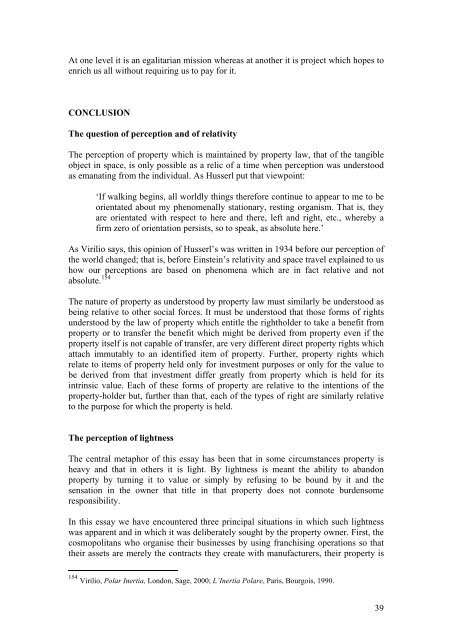The Unbearable Lightness of Property - alastairhudson.com
The Unbearable Lightness of Property - alastairhudson.com
The Unbearable Lightness of Property - alastairhudson.com
Create successful ePaper yourself
Turn your PDF publications into a flip-book with our unique Google optimized e-Paper software.
At one level it is an egalitarian mission whereas at another it is project which hopes to<br />
enrich us all without requiring us to pay for it.<br />
CONCLUSION<br />
<strong>The</strong> question <strong>of</strong> perception and <strong>of</strong> relativity<br />
<strong>The</strong> perception <strong>of</strong> property which is maintained by property law, that <strong>of</strong> the tangible<br />
object in space, is only possible as a relic <strong>of</strong> a time when perception was understood<br />
as emanating from the individual. As Husserl put that viewpoint:<br />
‘If walking begins, all worldly things therefore continue to appear to me to be<br />
orientated about my phenomenally stationary, resting organism. That is, they<br />
are orientated with respect to here and there, left and right, etc., whereby a<br />
firm zero <strong>of</strong> orientation persists, so to speak, as absolute here.’<br />
As Virilio says, this opinion <strong>of</strong> Husserl’s was written in 1934 before our perception <strong>of</strong><br />
the world changed; that is, before Einstein’s relativity and space travel explained to us<br />
how our perceptions are based on phenomena which are in fact relative and not<br />
absolute. 154<br />
<strong>The</strong> nature <strong>of</strong> property as understood by property law must similarly be understood as<br />
being relative to other social forces. It must be understood that those forms <strong>of</strong> rights<br />
understood by the law <strong>of</strong> property which entitle the rightholder to take a benefit from<br />
property or to transfer the benefit which might be derived from property even if the<br />
property itself is not capable <strong>of</strong> transfer, are very different direct property rights which<br />
attach immutably to an identified item <strong>of</strong> property. Further, property rights which<br />
relate to items <strong>of</strong> property held only for investment purposes or only for the value to<br />
be derived from that investment differ greatly from property which is held for its<br />
intrinsic value. Each <strong>of</strong> these forms <strong>of</strong> property are relative to the intentions <strong>of</strong> the<br />
property-holder but, further than that, each <strong>of</strong> the types <strong>of</strong> right are similarly relative<br />
to the purpose for which the property is held.<br />
<strong>The</strong> perception <strong>of</strong> lightness<br />
<strong>The</strong> central metaphor <strong>of</strong> this essay has been that in some circumstances property is<br />
heavy and that in others it is light. By lightness is meant the ability to abandon<br />
property by turning it to value or simply by refusing to be bound by it and the<br />
sensation in the owner that title in that property does not connote burdensome<br />
responsibility.<br />
In this essay we have encountered three principal situations in which such lightness<br />
was apparent and in which it was deliberately sought by the property owner. First, the<br />
cosmopolitans who organise their businesses by using franchising operations so that<br />
their assets are merely the contracts they create with manufacturers, their property is<br />
154 Virilio, Polar Inertia, London, Sage, 2000; L’Inertia Polare, Paris, Bourgois, 1990.<br />
39













